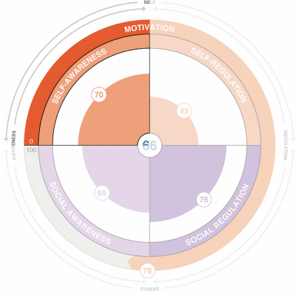What do the five dimensions of the EQ wheel measure?
Each dimension shows different aspects of the respondent.

The top left quadrant of the wheel is the score for Self-Awareness. Self-awareness is the ability to recognize and understand your moods, emotions and drives. People who have mastered EQ have the self-awareness to observe the linkage between their thoughts and their feelings. Thoughts, in the form of attitudes, beliefs, and expectations, create the context for the evaluation of our experience.

The top right quadrant of the wheel is the score for Self-Regulation. Self-Regulation is the ability to control or redirect disruptive impulses and moods and the propensity to suspend judgment and think before acting. We have emotions about things as they happen, and our emotions may affect the decisions we make. Self-Regulation is a skill we use on a day-to-day basis to manage our emotions in the moment that an event occurs, so we can take thoughtful actions. High Self-awareness also enables us to take responsibility for our feelings and to Self-Regulate when we are not having the best of days.
 The lower left quadrant is the score for Social Awareness. Social Awareness is the ability to understand the emotional makeup of other people and how your words and actions affect others. Everyone is in their own unique emotional state every day, which can affect their
The lower left quadrant is the score for Social Awareness. Social Awareness is the ability to understand the emotional makeup of other people and how your words and actions affect others. Everyone is in their own unique emotional state every day, which can affect their
work and how they relate with others. Because of this, working on Social Awareness can improve your own work and interactions. Just as you can practice taking your own emotional temperature throughout the day, you can make a point of becoming more observant of others’ feeling too.
 The lower right quadrant is the score for Social Regulation. Social Regulation is the ability to influence the emotional clarity of others through a proficiency in managing relationships and building networks. There are a constellation of abilities involved in building a network of good relationships. To build good social regulation, a person must be able to take the emotional temperature of others and respond in ways that build rapport and common ground. Good Social Regulation and social skills such as collaboration, are crucial to quality work and personal relationships.
The lower right quadrant is the score for Social Regulation. Social Regulation is the ability to influence the emotional clarity of others through a proficiency in managing relationships and building networks. There are a constellation of abilities involved in building a network of good relationships. To build good social regulation, a person must be able to take the emotional temperature of others and respond in ways that build rapport and common ground. Good Social Regulation and social skills such as collaboration, are crucial to quality work and personal relationships.
Around these quadrants is the score for Motivation. Motivation is a passion to work for reasons that go beyond the external drive for knowledge, utility, surroundings, others, power or methodology and are based on internal drive or propensity to pursue goals with energy and persistence. It is a passion to work for reasons that go beyond money or status and a propensity to pursue goals with a higher level of understanding the emotional value of one’s activity. Motivation has always been a hot topic because there is abundant evidence that when an individual is highly motivated, they achieve great things. If it could be mass produced, it would be the proverbial “lightning in a bottle.” In reality, motivation is a personal matter that can be very different from person to person.
If you have any questions, or if something does not work, please reach out to our Partner Support Team member by clicking the chat button in the lower right corner, or call us at (800) 869-6908. We will be happy to help.